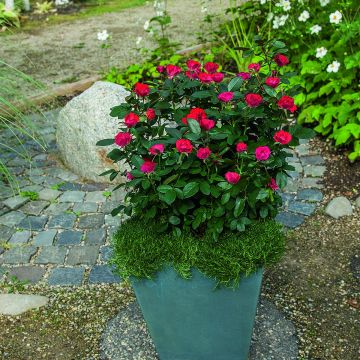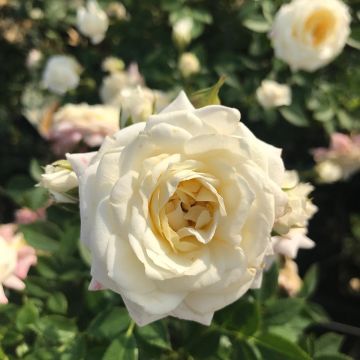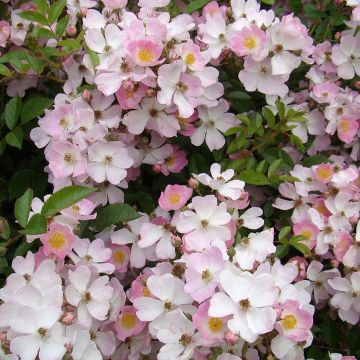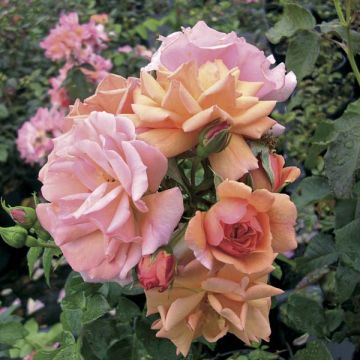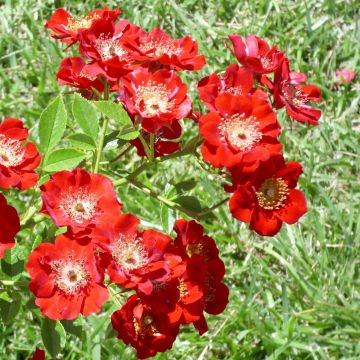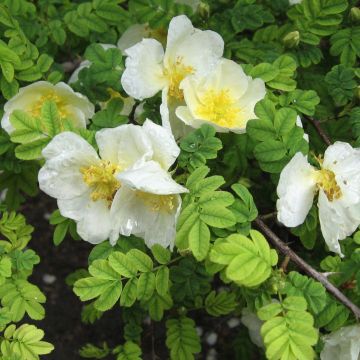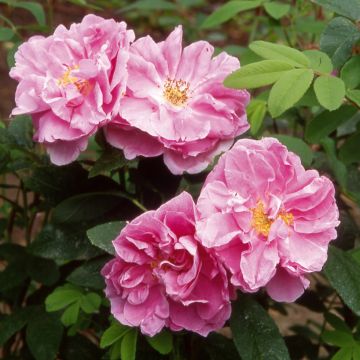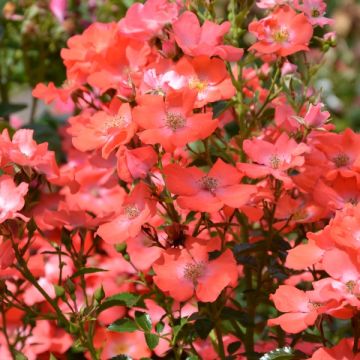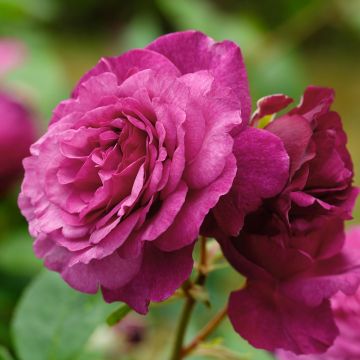

Rosa x floribunda 'Favorite' - Floribunda Rose


Rosa x floribunda 'Favorite' - Floribunda Rose
Rosa x floribunda 'Favorite' - Floribunda Rose
Rosa x floribunda Favorite
This item cannot be shipped to the selected country
Delivery charge from €5.90
Delivery charge from €5.90
Delivery to Corse prohibited
More information
Schedule delivery date,
and select date in basket
This plant carries a 24 months recovery warranty
More information
We guarantee the quality of our plants for a full growing cycle, and will replace at our expense any plant that fails to recover under normal climatic and planting conditions.
From €5.90 for pickup delivery and €6.90 for home delivery
Express home delivery from €8.90.
From €5.90 for pickup delivery and €6.90 for home delivery
Express home delivery from €8.90.
Delivery to Corse prohibited: UE law prohibits the import of this plant from mainland France to Corse as part of the fight against Xylella fastidiosa. Please accept our sincere apologies.
More information
Does this plant fit my garden?
Set up your Plantfit profile →
Description
The 'Favorite' Rose is beautiful and floriferous with clustered flowers. Very compact, not exceeding 50 cm (20in) in height, its upright stems carry beautiful double flowers in bouquets. Well, double, adopting the typical shape of tea hybrids, the roses have a beautiful salmon pink colour and are slightly fragrant. They are perfectly highlighted by the green foliage, which remains healthy throughout the season, as this rose is resistant to diseases. Ideal for borders and as a foreground in mixed borders, Favorite can also be easily grown in pots to decorate a balcony or terrace.
The 'Favorite' Rose is a beautiful Belgian company Louis Lens creation. It was introduced to the market in 1980 and awarded a silver medal in 1982 at the Courtrai competition in Belgium. As a major member of the Rosaceae family, the genus Rosa is rich in numerous botanical species and many horticultural hybrids classified into large categories. Favorite is thus classified in the group of floribunda roses, with flowers clustered in large corymbs at the end of young shoots. This fast-growing variety forms a low bush, about 40 to 50 cm (16 to 20in) in height and approximately 40 cm (16in) in width. Its well-upright stems give it an erect habit, with cut, medium green, semi-glossy foliage highly resistant to the usual diseases of roses. This allows it to create a beautiful setting to showcase its flowering. The flowering period begins in June and continues until October if the faded flowers are regularly pruned to encourage the emergence of new ones. The double roses, which have the characteristic shape of hybrid tea roses, eventually fully open to reveal the stamens clustered in their centre. They commonly measure 7 cm (3in) in diameter and are grouped in bouquets above the foliage, attracting attention with their bright colour, a delightful salmon pink. Slightly fragrant, they create a very ornamental mass effect when planted in groups.
Its compactness allows this rose to be used in multiple situations. Planted in pots, it will brighten a balcony or terrace with abundant flowering throughout the summer. It will also make a superb border if integrated into a mixed border. Plant perennials like Iris alongside it, with a few clumps of varieties with varying earliness, to extend the flowering season into spring. Their graphic flowers and blue-green sword-shaped leaves combine exceptionally well with roses. Behind Favorite, a tall Delphinium such as Delphinium Pacific Blue Bird will create a sumptuous contrast of colours with its endless spikes of blue flowers. To add a touch of white, plant a clump of Liatris spicata Floristan White behind Favorite, which will stretch its long feathery spikes above the vegetation of your rose. Also, consider shrubs and think about colourful foliage, such as Physocarpus opulifolius Black Light with its beautiful dark purple cut leaves or Cotinus coggygria Golden Lady with its rounded leaves that change from orange-yellow to gold before turning orange in autumn... This floribunda rose also allows you to create beautiful low hedges, planted mixed along a path or to highlight a small sunken path.
Report an error about the product description
Rosa x floribunda 'Favorite' - Floribunda Rose in pictures


Plant habit
Flowering
Foliage
Botanical data
Rosa
x floribunda
Favorite
Rosaceae
Cultivar or hybrid
Other Polyantha clustered Roses
Planting and care
Plant the 'Favorite' Rose in ordinary, well-tilled, well-fertilised, and well-drained soil from November to March. Roses prefer clayey soils that are relatively heavy than light. In soils that are too sandy, compact, or dry in summer, it is preferable to add compost or well-rotted manure to the substrate during planting.
Soak the root ball in a bucket of water for fifteen minutes before planting, then place the rose in the planting hole, backfill around it, and water abundantly. Then, provide regular watering in the first year, gradually spacing them out afterwards to encourage the roots to grow deep into the soil.
Plant this rose in a sunny location or, at most, in partial shade in hot climates. Roses are hungry plants so that a specific fertiliser will be beneficial at the start of the growing season and regularly throughout the flowering period. Preferably, choose organic fertilisers that are richer in potassium (the K in the NPK formula) than in nitrogen (the N).
Roses may develop unsightly stains at the end of summer, but this is a natural occurrence that does not harm their growth.
Planting period
Intended location
Care
This item has not been reviewed yet - be the first to leave a review about it.
Roses by purpose
Haven't found what you were looking for?
Hardiness is the lowest winter temperature a plant can endure without suffering serious damage or even dying. However, hardiness is affected by location (a sheltered area, such as a patio), protection (winter cover) and soil type (hardiness is improved by well-drained soil).

Photo Sharing Terms & Conditions
In order to encourage gardeners to interact and share their experiences, Promesse de fleurs offers various media enabling content to be uploaded onto its Site - in particular via the ‘Photo sharing’ module.
The User agrees to refrain from:
- Posting any content that is illegal, prejudicial, insulting, racist, inciteful to hatred, revisionist, contrary to public decency, that infringes on privacy or on the privacy rights of third parties, in particular the publicity rights of persons and goods, intellectual property rights, or the right to privacy.
- Submitting content on behalf of a third party;
- Impersonate the identity of a third party and/or publish any personal information about a third party;
In general, the User undertakes to refrain from any unethical behaviour.
All Content (in particular text, comments, files, images, photos, videos, creative works, etc.), which may be subject to property or intellectual property rights, image or other private rights, shall remain the property of the User, subject to the limited rights granted by the terms of the licence granted by Promesse de fleurs as stated below. Users are at liberty to publish or not to publish such Content on the Site, notably via the ‘Photo Sharing’ facility, and accept that this Content shall be made public and freely accessible, notably on the Internet.
Users further acknowledge, undertake to have ,and guarantee that they hold all necessary rights and permissions to publish such material on the Site, in particular with regard to the legislation in force pertaining to any privacy, property, intellectual property, image, or contractual rights, or rights of any other nature. By publishing such Content on the Site, Users acknowledge accepting full liability as publishers of the Content within the meaning of the law, and grant Promesse de fleurs, free of charge, an inclusive, worldwide licence for the said Content for the entire duration of its publication, including all reproduction, representation, up/downloading, displaying, performing, transmission, and storage rights.
Users also grant permission for their name to be linked to the Content and accept that this link may not always be made available.
By engaging in posting material, Users consent to their Content becoming automatically accessible on the Internet, in particular on other sites and/or blogs and/or web pages of the Promesse de fleurs site, including in particular social pages and the Promesse de fleurs catalogue.
Users may secure the removal of entrusted content free of charge by issuing a simple request via our contact form.
The flowering period indicated on our website applies to countries and regions located in USDA zone 8 (France, the United Kingdom, Ireland, the Netherlands, etc.)
It will vary according to where you live:
- In zones 9 to 10 (Italy, Spain, Greece, etc.), flowering will occur about 2 to 4 weeks earlier.
- In zones 6 to 7 (Germany, Poland, Slovenia, and lower mountainous regions), flowering will be delayed by 2 to 3 weeks.
- In zone 5 (Central Europe, Scandinavia), blooming will be delayed by 3 to 5 weeks.
In temperate climates, pruning of spring-flowering shrubs (forsythia, spireas, etc.) should be done just after flowering.
Pruning of summer-flowering shrubs (Indian Lilac, Perovskia, etc.) can be done in winter or spring.
In cold regions as well as with frost-sensitive plants, avoid pruning too early when severe frosts may still occur.
The planting period indicated on our website applies to countries and regions located in USDA zone 8 (France, United Kingdom, Ireland, Netherlands).
It will vary according to where you live:
- In Mediterranean zones (Marseille, Madrid, Milan, etc.), autumn and winter are the best planting periods.
- In continental zones (Strasbourg, Munich, Vienna, etc.), delay planting by 2 to 3 weeks in spring and bring it forward by 2 to 4 weeks in autumn.
- In mountainous regions (the Alps, Pyrenees, Carpathians, etc.), it is best to plant in late spring (May-June) or late summer (August-September).
The harvesting period indicated on our website applies to countries and regions in USDA zone 8 (France, England, Ireland, the Netherlands).
In colder areas (Scandinavia, Poland, Austria...) fruit and vegetable harvests are likely to be delayed by 3-4 weeks.
In warmer areas (Italy, Spain, Greece, etc.), harvesting will probably take place earlier, depending on weather conditions.
The sowing periods indicated on our website apply to countries and regions within USDA Zone 8 (France, UK, Ireland, Netherlands).
In colder areas (Scandinavia, Poland, Austria...), delay any outdoor sowing by 3-4 weeks, or sow under glass.
In warmer climes (Italy, Spain, Greece, etc.), bring outdoor sowing forward by a few weeks.










































